Effective Goal Achievement: Motivation Theories at Richer Sounds
VerifiedAdded on 2023/01/05
|8
|1445
|87
Report
AI Summary
This report examines the influence of content and process theories of motivation on goal achievement within an organizational context, using Richer Sounds as a case study. The report begins by defining motivation and then delves into content theories, specifically Maslow's hierarchy of needs, illustrating how Richer Sounds addresses physiological, safety, belonging, esteem, and self-actualization needs of its employees. The report then explores process theories, focusing on Vroom's expectancy theory, and analyzes the impact of valence, expectancy, and instrumentality on employee motivation and performance. The analysis considers how Richer Sounds can apply these theories to enhance employee motivation, engagement, and ultimately, achieve its organizational goals. The report concludes by summarizing the key findings and implications of the application of these motivational theories. The assignment is contributed by a student to be published on the website Desklib. Desklib is a platform which provides all the necessary AI based study tools for students.
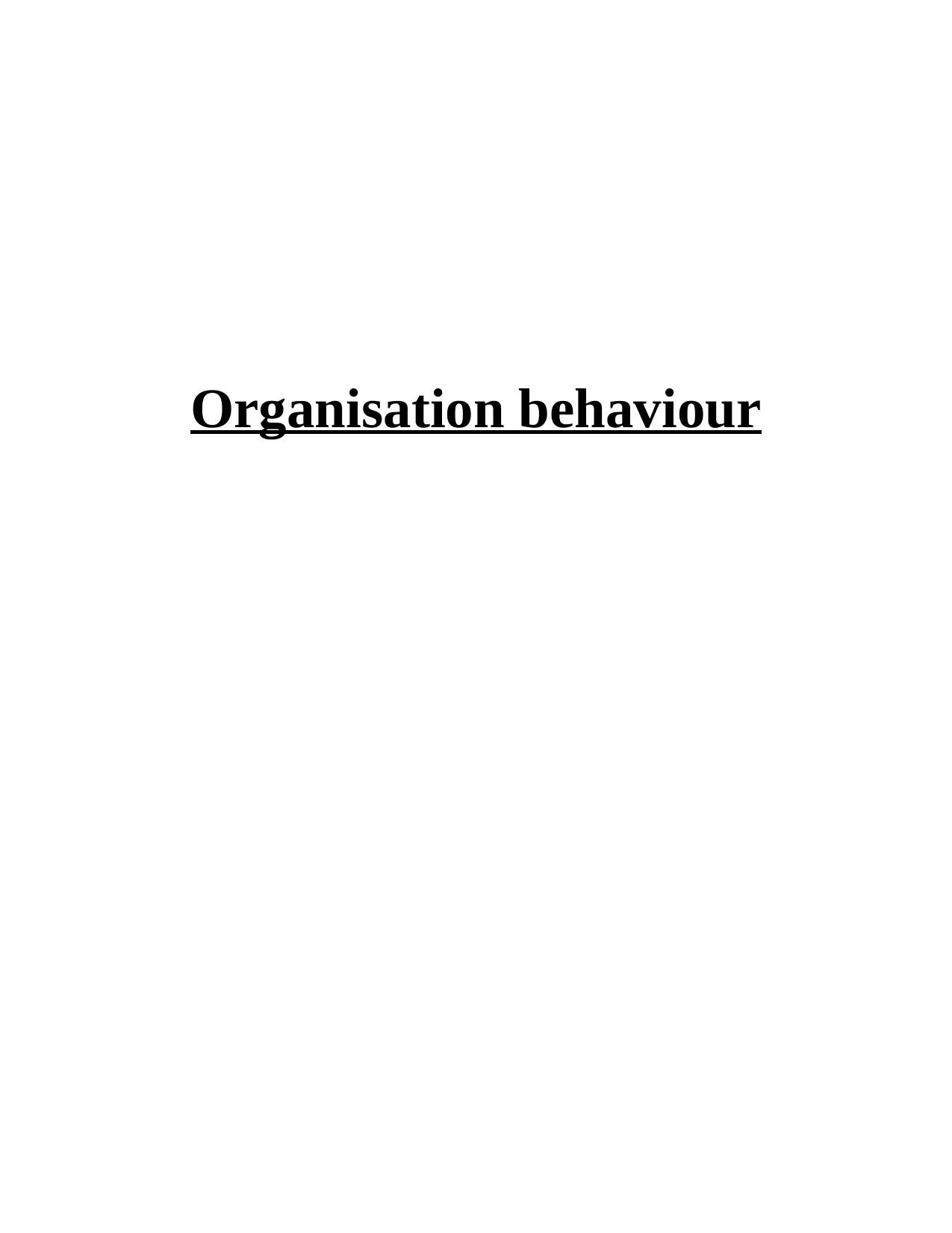
Organisation behaviour
Paraphrase This Document
Need a fresh take? Get an instant paraphrase of this document with our AI Paraphraser
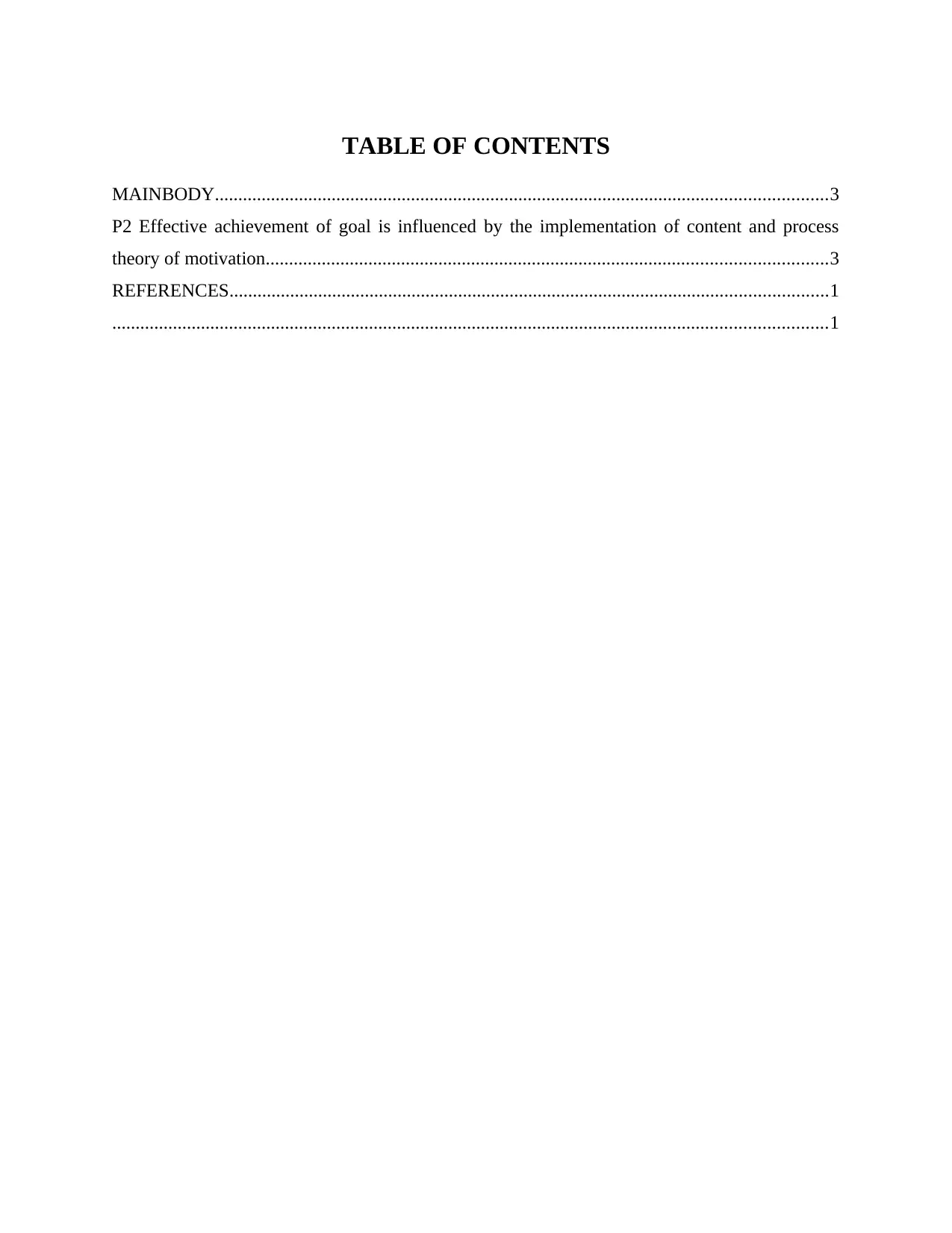
TABLE OF CONTENTS
MAINBODY...................................................................................................................................3
P2 Effective achievement of goal is influenced by the implementation of content and process
theory of motivation........................................................................................................................3
REFERENCES................................................................................................................................1
.........................................................................................................................................................1
MAINBODY...................................................................................................................................3
P2 Effective achievement of goal is influenced by the implementation of content and process
theory of motivation........................................................................................................................3
REFERENCES................................................................................................................................1
.........................................................................................................................................................1
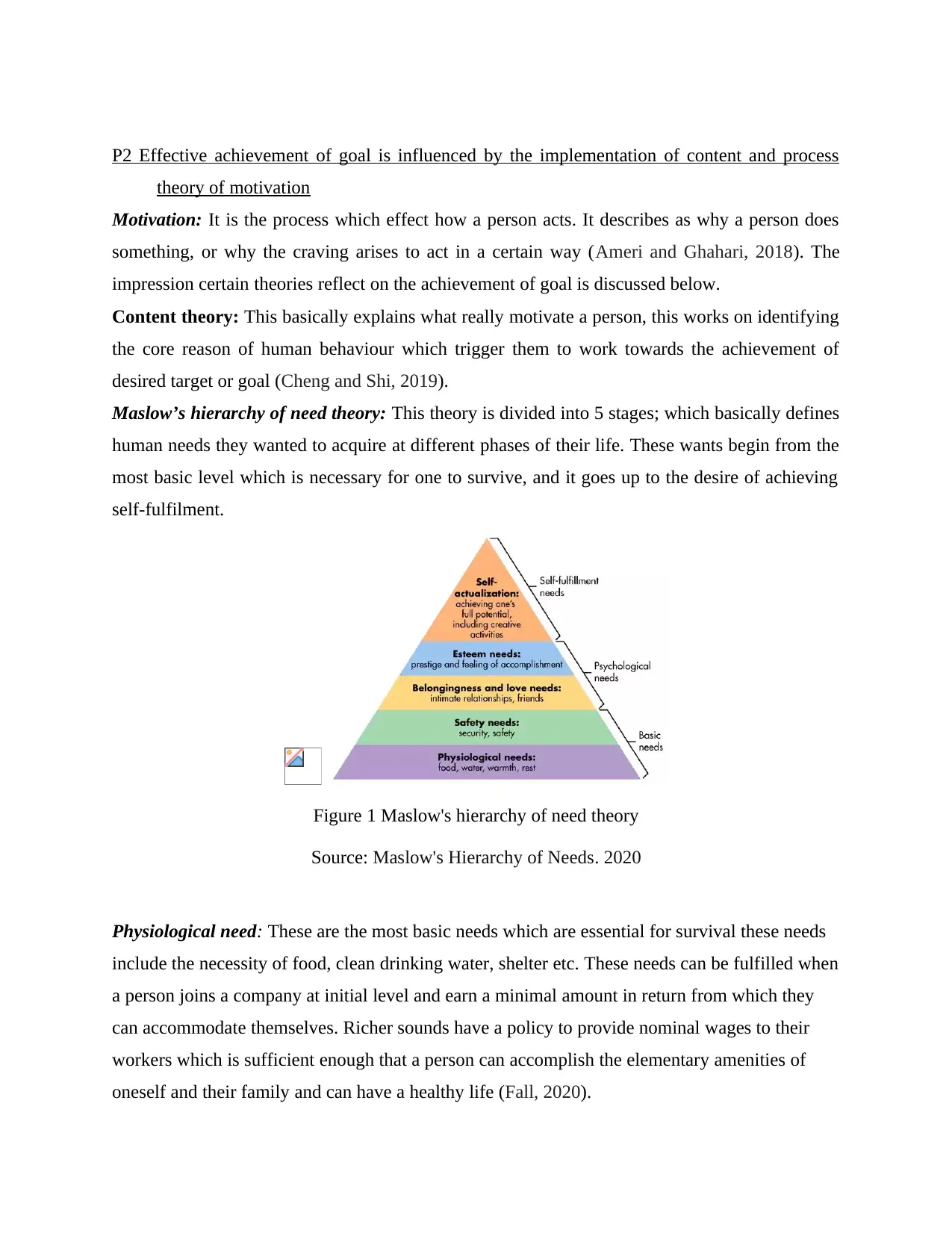
P2 Effective achievement of goal is influenced by the implementation of content and process
theory of motivation
Motivation: It is the process which effect how a person acts. It describes as why a person does
something, or why the craving arises to act in a certain way (Ameri and Ghahari, 2018). The
impression certain theories reflect on the achievement of goal is discussed below.
Content theory: This basically explains what really motivate a person, this works on identifying
the core reason of human behaviour which trigger them to work towards the achievement of
desired target or goal (Cheng and Shi, 2019).
Maslow’s hierarchy of need theory: This theory is divided into 5 stages; which basically defines
human needs they wanted to acquire at different phases of their life. These wants begin from the
most basic level which is necessary for one to survive, and it goes up to the desire of achieving
self-fulfilment.
Figure 1 Maslow's hierarchy of need theory
Source: Maslow's Hierarchy of Needs. 2020
Physiological need: These are the most basic needs which are essential for survival these needs
include the necessity of food, clean drinking water, shelter etc. These needs can be fulfilled when
a person joins a company at initial level and earn a minimal amount in return from which they
can accommodate themselves. Richer sounds have a policy to provide nominal wages to their
workers which is sufficient enough that a person can accomplish the elementary amenities of
oneself and their family and can have a healthy life (Fall, 2020).
theory of motivation
Motivation: It is the process which effect how a person acts. It describes as why a person does
something, or why the craving arises to act in a certain way (Ameri and Ghahari, 2018). The
impression certain theories reflect on the achievement of goal is discussed below.
Content theory: This basically explains what really motivate a person, this works on identifying
the core reason of human behaviour which trigger them to work towards the achievement of
desired target or goal (Cheng and Shi, 2019).
Maslow’s hierarchy of need theory: This theory is divided into 5 stages; which basically defines
human needs they wanted to acquire at different phases of their life. These wants begin from the
most basic level which is necessary for one to survive, and it goes up to the desire of achieving
self-fulfilment.
Figure 1 Maslow's hierarchy of need theory
Source: Maslow's Hierarchy of Needs. 2020
Physiological need: These are the most basic needs which are essential for survival these needs
include the necessity of food, clean drinking water, shelter etc. These needs can be fulfilled when
a person joins a company at initial level and earn a minimal amount in return from which they
can accommodate themselves. Richer sounds have a policy to provide nominal wages to their
workers which is sufficient enough that a person can accomplish the elementary amenities of
oneself and their family and can have a healthy life (Fall, 2020).
⊘ This is a preview!⊘
Do you want full access?
Subscribe today to unlock all pages.

Trusted by 1+ million students worldwide
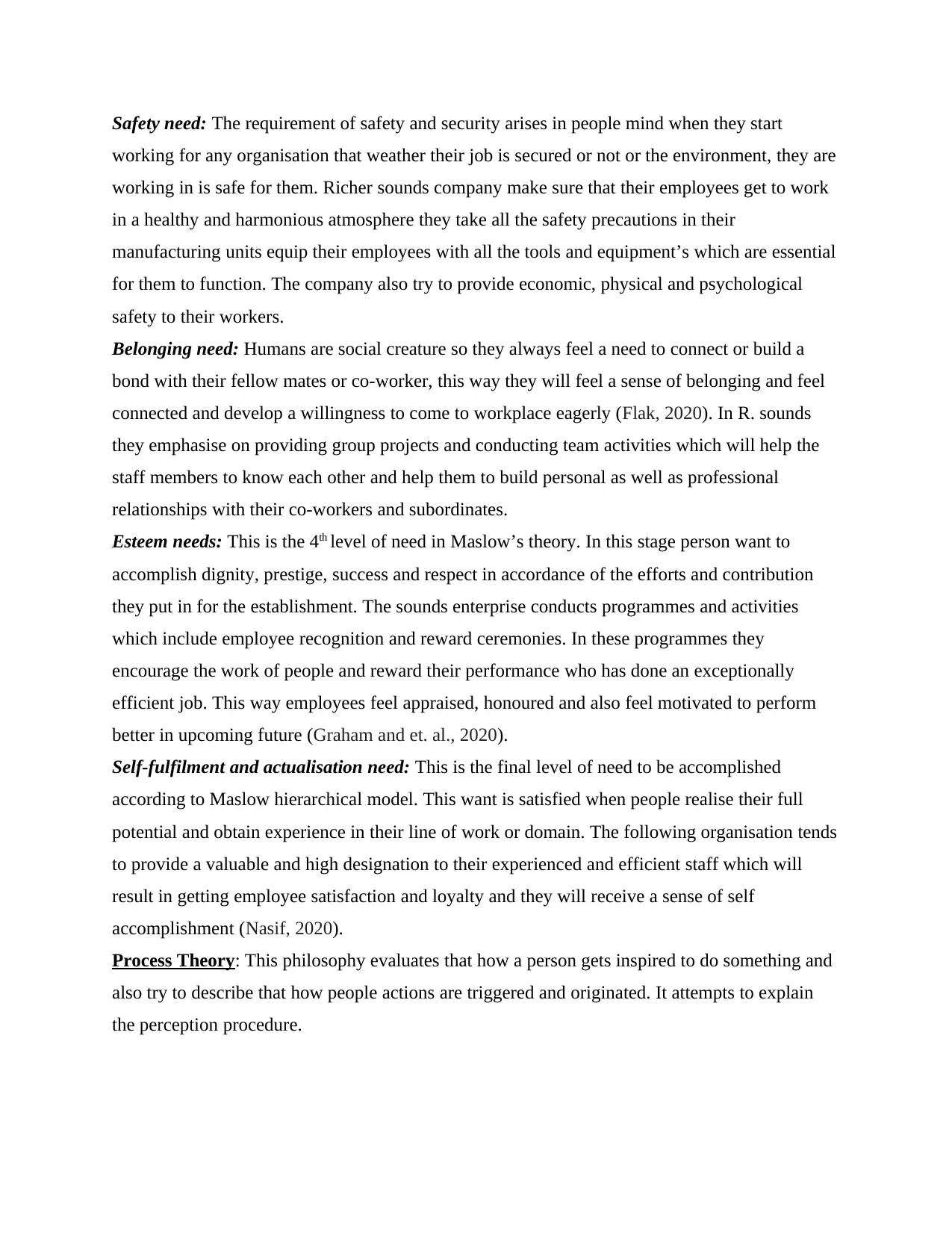
Safety need: The requirement of safety and security arises in people mind when they start
working for any organisation that weather their job is secured or not or the environment, they are
working in is safe for them. Richer sounds company make sure that their employees get to work
in a healthy and harmonious atmosphere they take all the safety precautions in their
manufacturing units equip their employees with all the tools and equipment’s which are essential
for them to function. The company also try to provide economic, physical and psychological
safety to their workers.
Belonging need: Humans are social creature so they always feel a need to connect or build a
bond with their fellow mates or co-worker, this way they will feel a sense of belonging and feel
connected and develop a willingness to come to workplace eagerly (Flak, 2020). In R. sounds
they emphasise on providing group projects and conducting team activities which will help the
staff members to know each other and help them to build personal as well as professional
relationships with their co-workers and subordinates.
Esteem needs: This is the 4th level of need in Maslow’s theory. In this stage person want to
accomplish dignity, prestige, success and respect in accordance of the efforts and contribution
they put in for the establishment. The sounds enterprise conducts programmes and activities
which include employee recognition and reward ceremonies. In these programmes they
encourage the work of people and reward their performance who has done an exceptionally
efficient job. This way employees feel appraised, honoured and also feel motivated to perform
better in upcoming future (Graham and et. al., 2020).
Self-fulfilment and actualisation need: This is the final level of need to be accomplished
according to Maslow hierarchical model. This want is satisfied when people realise their full
potential and obtain experience in their line of work or domain. The following organisation tends
to provide a valuable and high designation to their experienced and efficient staff which will
result in getting employee satisfaction and loyalty and they will receive a sense of self
accomplishment (Nasif, 2020).
Process Theory: This philosophy evaluates that how a person gets inspired to do something and
also try to describe that how people actions are triggered and originated. It attempts to explain
the perception procedure.
working for any organisation that weather their job is secured or not or the environment, they are
working in is safe for them. Richer sounds company make sure that their employees get to work
in a healthy and harmonious atmosphere they take all the safety precautions in their
manufacturing units equip their employees with all the tools and equipment’s which are essential
for them to function. The company also try to provide economic, physical and psychological
safety to their workers.
Belonging need: Humans are social creature so they always feel a need to connect or build a
bond with their fellow mates or co-worker, this way they will feel a sense of belonging and feel
connected and develop a willingness to come to workplace eagerly (Flak, 2020). In R. sounds
they emphasise on providing group projects and conducting team activities which will help the
staff members to know each other and help them to build personal as well as professional
relationships with their co-workers and subordinates.
Esteem needs: This is the 4th level of need in Maslow’s theory. In this stage person want to
accomplish dignity, prestige, success and respect in accordance of the efforts and contribution
they put in for the establishment. The sounds enterprise conducts programmes and activities
which include employee recognition and reward ceremonies. In these programmes they
encourage the work of people and reward their performance who has done an exceptionally
efficient job. This way employees feel appraised, honoured and also feel motivated to perform
better in upcoming future (Graham and et. al., 2020).
Self-fulfilment and actualisation need: This is the final level of need to be accomplished
according to Maslow hierarchical model. This want is satisfied when people realise their full
potential and obtain experience in their line of work or domain. The following organisation tends
to provide a valuable and high designation to their experienced and efficient staff which will
result in getting employee satisfaction and loyalty and they will receive a sense of self
accomplishment (Nasif, 2020).
Process Theory: This philosophy evaluates that how a person gets inspired to do something and
also try to describe that how people actions are triggered and originated. It attempts to explain
the perception procedure.
Paraphrase This Document
Need a fresh take? Get an instant paraphrase of this document with our AI Paraphraser
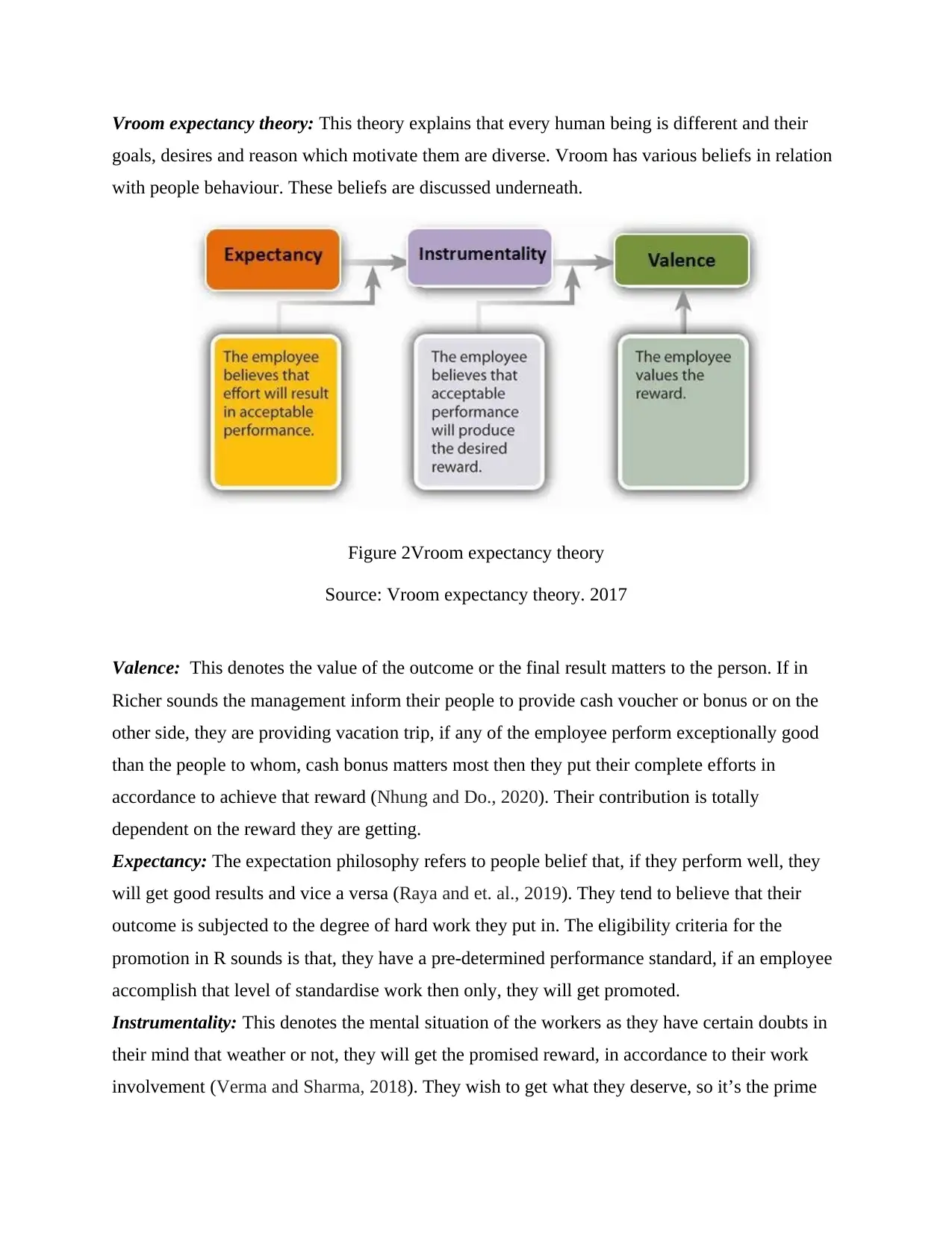
Vroom expectancy theory: This theory explains that every human being is different and their
goals, desires and reason which motivate them are diverse. Vroom has various beliefs in relation
with people behaviour. These beliefs are discussed underneath.
Figure 2Vroom expectancy theory
Source: Vroom expectancy theory. 2017
Valence: This denotes the value of the outcome or the final result matters to the person. If in
Richer sounds the management inform their people to provide cash voucher or bonus or on the
other side, they are providing vacation trip, if any of the employee perform exceptionally good
than the people to whom, cash bonus matters most then they put their complete efforts in
accordance to achieve that reward (Nhung and Do., 2020). Their contribution is totally
dependent on the reward they are getting.
Expectancy: The expectation philosophy refers to people belief that, if they perform well, they
will get good results and vice a versa (Raya and et. al., 2019). They tend to believe that their
outcome is subjected to the degree of hard work they put in. The eligibility criteria for the
promotion in R sounds is that, they have a pre-determined performance standard, if an employee
accomplish that level of standardise work then only, they will get promoted.
Instrumentality: This denotes the mental situation of the workers as they have certain doubts in
their mind that weather or not, they will get the promised reward, in accordance to their work
involvement (Verma and Sharma, 2018). They wish to get what they deserve, so it’s the prime
goals, desires and reason which motivate them are diverse. Vroom has various beliefs in relation
with people behaviour. These beliefs are discussed underneath.
Figure 2Vroom expectancy theory
Source: Vroom expectancy theory. 2017
Valence: This denotes the value of the outcome or the final result matters to the person. If in
Richer sounds the management inform their people to provide cash voucher or bonus or on the
other side, they are providing vacation trip, if any of the employee perform exceptionally good
than the people to whom, cash bonus matters most then they put their complete efforts in
accordance to achieve that reward (Nhung and Do., 2020). Their contribution is totally
dependent on the reward they are getting.
Expectancy: The expectation philosophy refers to people belief that, if they perform well, they
will get good results and vice a versa (Raya and et. al., 2019). They tend to believe that their
outcome is subjected to the degree of hard work they put in. The eligibility criteria for the
promotion in R sounds is that, they have a pre-determined performance standard, if an employee
accomplish that level of standardise work then only, they will get promoted.
Instrumentality: This denotes the mental situation of the workers as they have certain doubts in
their mind that weather or not, they will get the promised reward, in accordance to their work
involvement (Verma and Sharma, 2018). They wish to get what they deserve, so it’s the prime
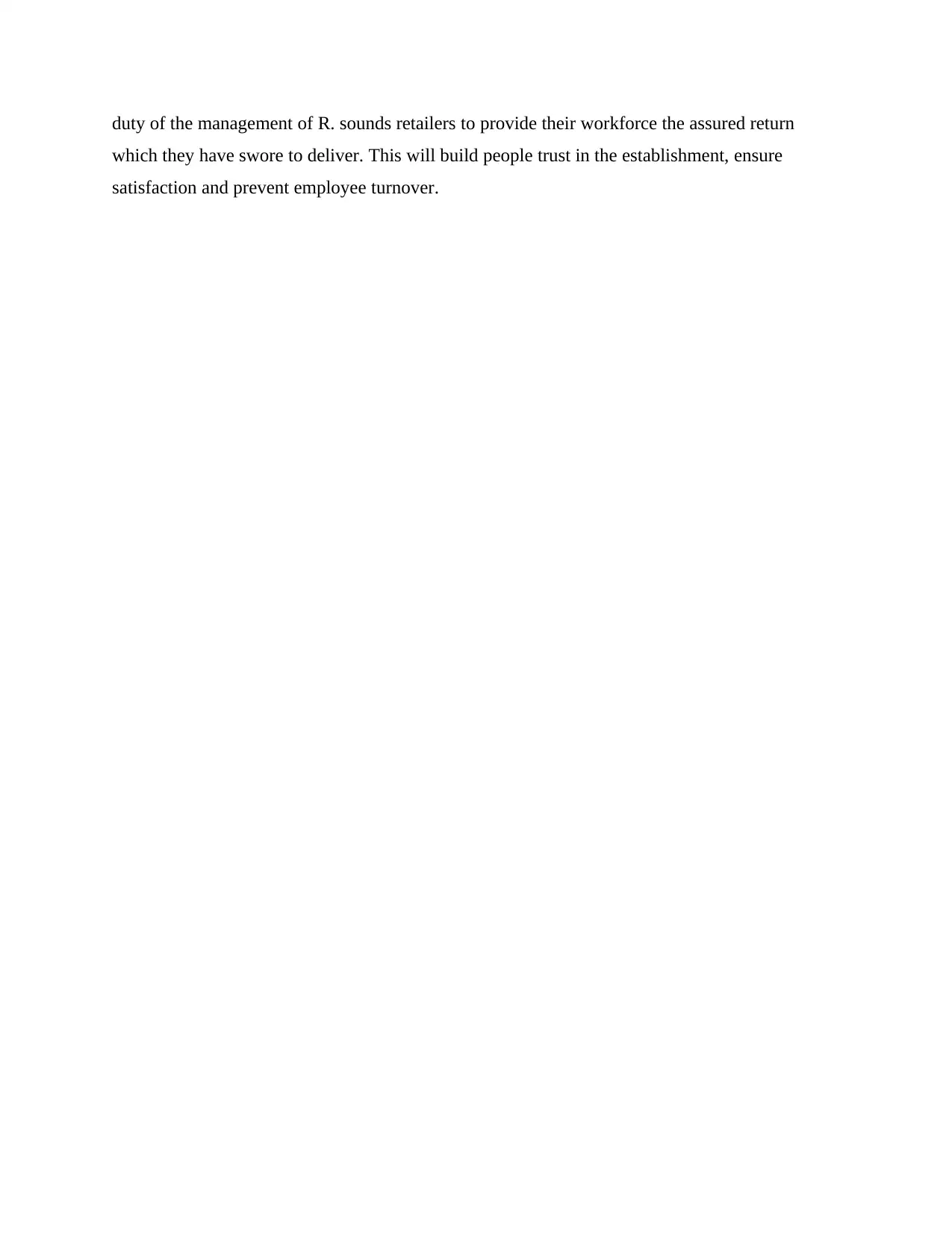
duty of the management of R. sounds retailers to provide their workforce the assured return
which they have swore to deliver. This will build people trust in the establishment, ensure
satisfaction and prevent employee turnover.
which they have swore to deliver. This will build people trust in the establishment, ensure
satisfaction and prevent employee turnover.
⊘ This is a preview!⊘
Do you want full access?
Subscribe today to unlock all pages.

Trusted by 1+ million students worldwide
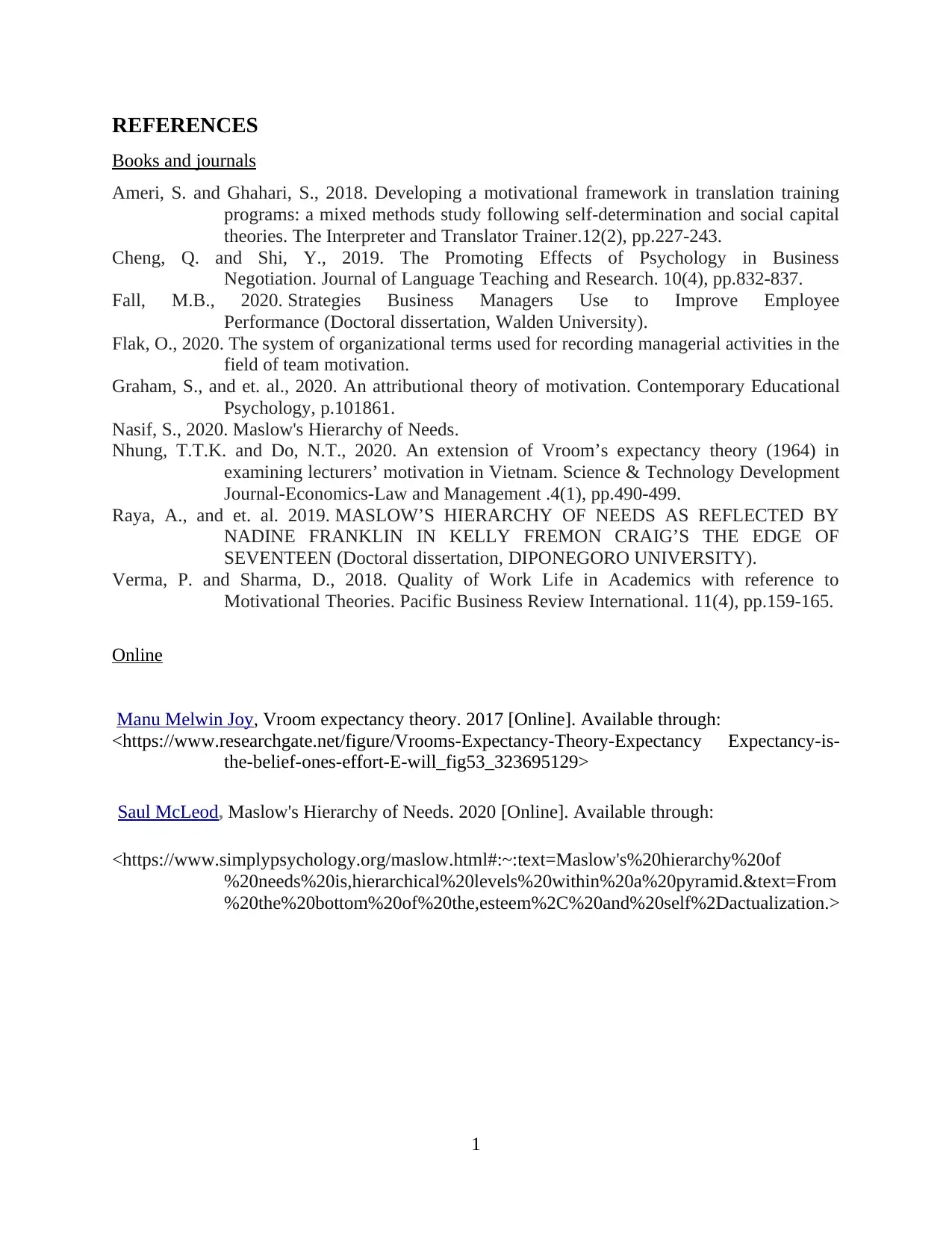
REFERENCES
Books and journals
Ameri, S. and Ghahari, S., 2018. Developing a motivational framework in translation training
programs: a mixed methods study following self-determination and social capital
theories. The Interpreter and Translator Trainer.12(2), pp.227-243.
Cheng, Q. and Shi, Y., 2019. The Promoting Effects of Psychology in Business
Negotiation. Journal of Language Teaching and Research. 10(4), pp.832-837.
Fall, M.B., 2020. Strategies Business Managers Use to Improve Employee
Performance (Doctoral dissertation, Walden University).
Flak, O., 2020. The system of organizational terms used for recording managerial activities in the
field of team motivation.
Graham, S., and et. al., 2020. An attributional theory of motivation. Contemporary Educational
Psychology, p.101861.
Nasif, S., 2020. Maslow's Hierarchy of Needs.
Nhung, T.T.K. and Do, N.T., 2020. An extension of Vroom’s expectancy theory (1964) in
examining lecturers’ motivation in Vietnam. Science & Technology Development
Journal-Economics-Law and Management .4(1), pp.490-499.
Raya, A., and et. al. 2019. MASLOW’S HIERARCHY OF NEEDS AS REFLECTED BY
NADINE FRANKLIN IN KELLY FREMON CRAIG’S THE EDGE OF
SEVENTEEN (Doctoral dissertation, DIPONEGORO UNIVERSITY).
Verma, P. and Sharma, D., 2018. Quality of Work Life in Academics with reference to
Motivational Theories. Pacific Business Review International. 11(4), pp.159-165.
Online
Manu Melwin Joy, Vroom expectancy theory. 2017 [Online]. Available through:
<https://www.researchgate.net/figure/Vrooms-Expectancy-Theory-Expectancy Expectancy-is-
the-belief-ones-effort-E-will_fig53_323695129>
Saul McLeod, Maslow's Hierarchy of Needs. 2020 [Online]. Available through:
<https://www.simplypsychology.org/maslow.html#:~:text=Maslow's%20hierarchy%20of
%20needs%20is,hierarchical%20levels%20within%20a%20pyramid.&text=From
%20the%20bottom%20of%20the,esteem%2C%20and%20self%2Dactualization.>
1
Books and journals
Ameri, S. and Ghahari, S., 2018. Developing a motivational framework in translation training
programs: a mixed methods study following self-determination and social capital
theories. The Interpreter and Translator Trainer.12(2), pp.227-243.
Cheng, Q. and Shi, Y., 2019. The Promoting Effects of Psychology in Business
Negotiation. Journal of Language Teaching and Research. 10(4), pp.832-837.
Fall, M.B., 2020. Strategies Business Managers Use to Improve Employee
Performance (Doctoral dissertation, Walden University).
Flak, O., 2020. The system of organizational terms used for recording managerial activities in the
field of team motivation.
Graham, S., and et. al., 2020. An attributional theory of motivation. Contemporary Educational
Psychology, p.101861.
Nasif, S., 2020. Maslow's Hierarchy of Needs.
Nhung, T.T.K. and Do, N.T., 2020. An extension of Vroom’s expectancy theory (1964) in
examining lecturers’ motivation in Vietnam. Science & Technology Development
Journal-Economics-Law and Management .4(1), pp.490-499.
Raya, A., and et. al. 2019. MASLOW’S HIERARCHY OF NEEDS AS REFLECTED BY
NADINE FRANKLIN IN KELLY FREMON CRAIG’S THE EDGE OF
SEVENTEEN (Doctoral dissertation, DIPONEGORO UNIVERSITY).
Verma, P. and Sharma, D., 2018. Quality of Work Life in Academics with reference to
Motivational Theories. Pacific Business Review International. 11(4), pp.159-165.
Online
Manu Melwin Joy, Vroom expectancy theory. 2017 [Online]. Available through:
<https://www.researchgate.net/figure/Vrooms-Expectancy-Theory-Expectancy Expectancy-is-
the-belief-ones-effort-E-will_fig53_323695129>
Saul McLeod, Maslow's Hierarchy of Needs. 2020 [Online]. Available through:
<https://www.simplypsychology.org/maslow.html#:~:text=Maslow's%20hierarchy%20of
%20needs%20is,hierarchical%20levels%20within%20a%20pyramid.&text=From
%20the%20bottom%20of%20the,esteem%2C%20and%20self%2Dactualization.>
1
Paraphrase This Document
Need a fresh take? Get an instant paraphrase of this document with our AI Paraphraser

2
1 out of 8
Related Documents
Your All-in-One AI-Powered Toolkit for Academic Success.
+13062052269
info@desklib.com
Available 24*7 on WhatsApp / Email
![[object Object]](/_next/static/media/star-bottom.7253800d.svg)
Unlock your academic potential
Copyright © 2020–2026 A2Z Services. All Rights Reserved. Developed and managed by ZUCOL.



